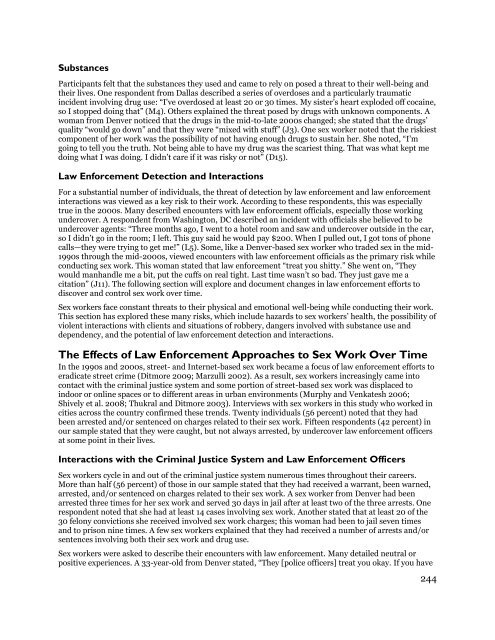413047-Underground-Commercial-Sex-Economy
413047-Underground-Commercial-Sex-Economy
413047-Underground-Commercial-Sex-Economy
Create successful ePaper yourself
Turn your PDF publications into a flip-book with our unique Google optimized e-Paper software.
Substances<br />
Participants felt that the substances they used and came to rely on posed a threat to their well-being and<br />
their lives. One respondent from Dallas described a series of overdoses and a particularly traumatic<br />
incident involving drug use: “I've overdosed at least 20 or 30 times. My sister’s heart exploded off cocaine,<br />
so I stopped doing that” (M4). Others explained the threat posed by drugs with unknown components. A<br />
woman from Denver noticed that the drugs in the mid-to-late 2000s changed; she stated that the drugs’<br />
quality “would go down” and that they were “mixed with stuff” (J3). One sex worker noted that the riskiest<br />
component of her work was the possibility of not having enough drugs to sustain her. She noted, “I’m<br />
going to tell you the truth. Not being able to have my drug was the scariest thing. That was what kept me<br />
doing what I was doing. I didn’t care if it was risky or not” (D15).<br />
Law Enforcement Detection and Interactions<br />
For a substantial number of individuals, the threat of detection by law enforcement and law enforcement<br />
interactions was viewed as a key risk to their work. According to these respondents, this was especially<br />
true in the 2000s. Many described encounters with law enforcement officials, especially those working<br />
undercover. A respondent from Washington, DC described an incident with officials she believed to be<br />
undercover agents: “Three months ago, I went to a hotel room and saw and undercover outside in the car,<br />
so I didn’t go in the room; I left. This guy said he would pay $200. When I pulled out, I got tons of phone<br />
calls—they were trying to get me!” (L5). Some, like a Denver-based sex worker who traded sex in the mid-<br />
1990s through the mid-2000s, viewed encounters with law enforcement officials as the primary risk while<br />
conducting sex work. This woman stated that law enforcement “treat you shitty.” She went on, “They<br />
would manhandle me a bit, put the cuffs on real tight. Last time wasn’t so bad. They just gave me a<br />
citation” (J11). The following section will explore and document changes in law enforcement efforts to<br />
discover and control sex work over time.<br />
<strong>Sex</strong> workers face constant threats to their physical and emotional well-being while conducting their work.<br />
This section has explored these many risks, which include hazards to sex workers’ health, the possibility of<br />
violent interactions with clients and situations of robbery, dangers involved with substance use and<br />
dependency, and the potential of law enforcement detection and interactions.<br />
The Effects of Law Enforcement Approaches to <strong>Sex</strong> Work Over Time<br />
In the 1990s and 2000s, street- and Internet-based sex work became a focus of law enforcement efforts to<br />
eradicate street crime (Ditmore 2009; Marzulli 2002). As a result, sex workers increasingly came into<br />
contact with the criminal justice system and some portion of street-based sex work was displaced to<br />
indoor or online spaces or to different areas in urban environments (Murphy and Venkatesh 2006;<br />
Shively et al. 2008; Thukral and Ditmore 2003). Interviews with sex workers in this study who worked in<br />
cities across the country confirmed these trends. Twenty individuals (56 percent) noted that they had<br />
been arrested and/or sentenced on charges related to their sex work. Fifteen respondents (42 percent) in<br />
our sample stated that they were caught, but not always arrested, by undercover law enforcement officers<br />
at some point in their lives.<br />
Interactions with the Criminal Justice System and Law Enforcement Officers<br />
<strong>Sex</strong> workers cycle in and out of the criminal justice system numerous times throughout their careers.<br />
More than half (56 percent) of those in our sample stated that they had received a warrant, been warned,<br />
arrested, and/or sentenced on charges related to their sex work. A sex worker from Denver had been<br />
arrested three times for her sex work and served 30 days in jail after at least two of the three arrests. One<br />
respondent noted that she had at least 14 cases involving sex work. Another stated that at least 20 of the<br />
30 felony convictions she received involved sex work charges; this woman had been to jail seven times<br />
and to prison nine times. A few sex workers explained that they had received a number of arrests and/or<br />
sentences involving both their sex work and drug use.<br />
<strong>Sex</strong> workers were asked to describe their encounters with law enforcement. Many detailed neutral or<br />
positive experiences. A 33-year-old from Denver stated, “They [police officers] treat you okay. If you have<br />
244


